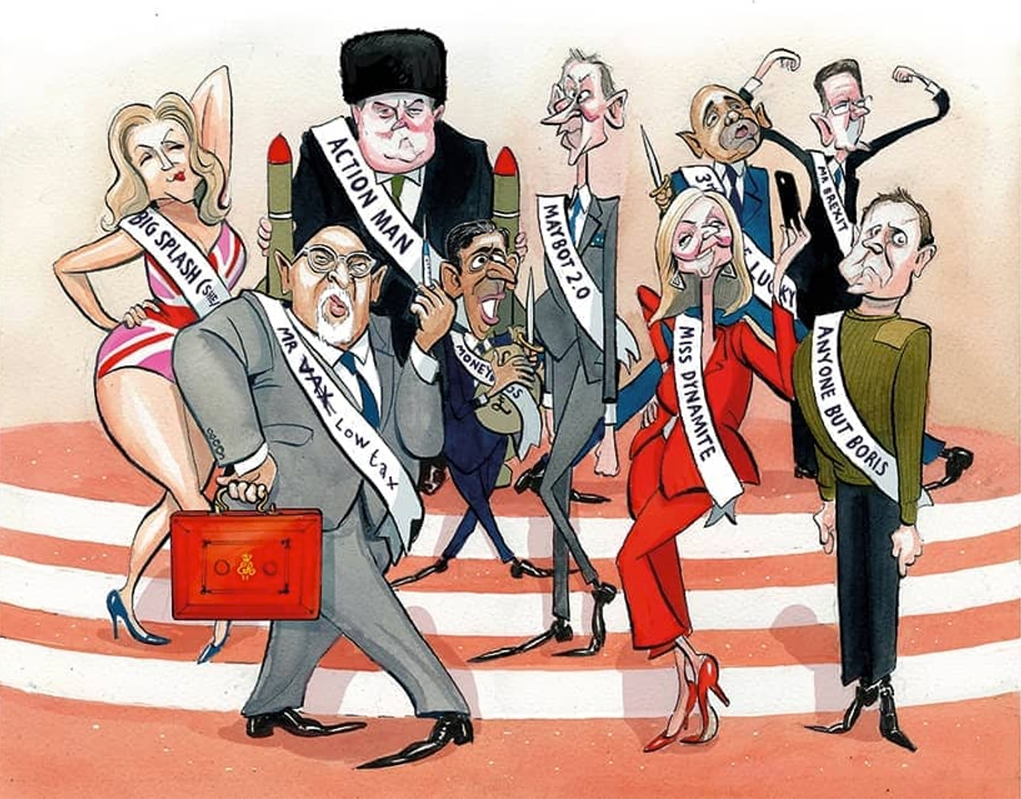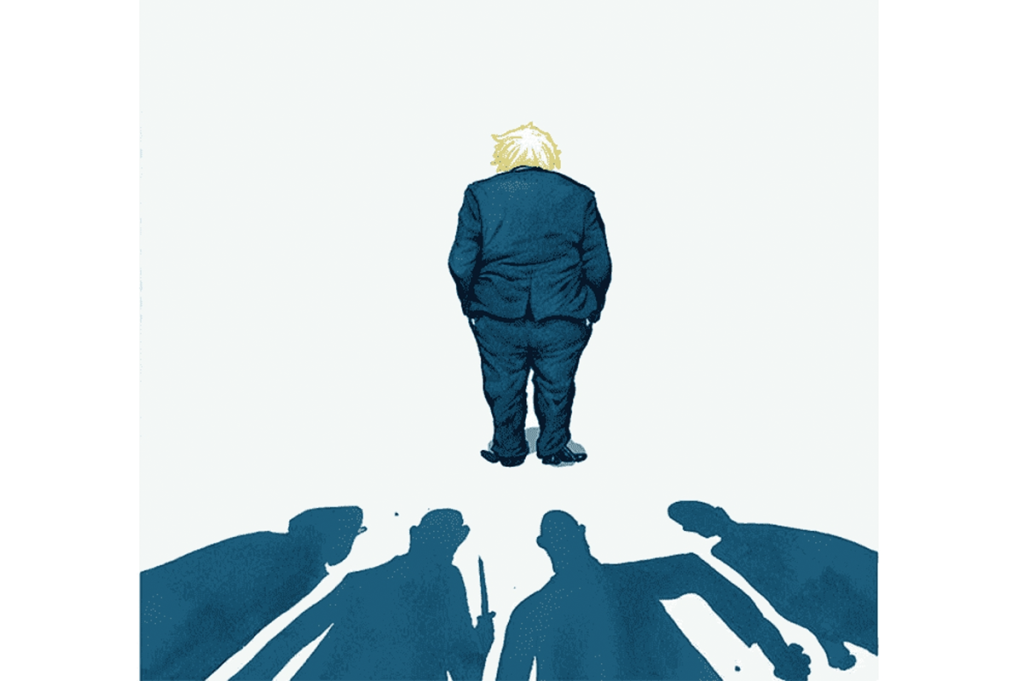In the end, Boris Johnson was damaged irreparably before he resigned on Thursday. The confidence vote wounded the British prime minister. Then two by-election defeats revealed that people were voting tactically against the Tories. A party that tolerated him because he was a vote-winner now concluded he was an electoral liability: rebellions followed and then (finally) his resignation. But the Conservatives are stuck confronting a basic question: what next?
The Tories are caught in a trap. One influential Tory MP who voted for Johnson in the no-confidence ballot told me, with a mixture of exhaustion and despair: “Please God, make it stop.” That sums up the mood. The Tories had been hoping for some kind of divine intervention because they do not know what else to do. They knew they wanted Johnson gone — but hadn’t much discussed what happens next.

But over the last few days, the outlines of the next leadership campaign have become clear. According to the Conservative Home survey of Tory activists, which has an impressive record in leadership contests, Ben Wallace is the new favorite. This is a sign of the respect in which Wallace’s leadership on Ukraine is held. A Scots Guards officer who has also served in the Scottish parliament, he is seen to be good in a crisis. With war in Europe and inflation worldwide, Tory members expect plenty of crises.
But even the closest students of the Tory Party would struggle to tell you what Wallace thinks about most domestic issues. He has been a Northern Ireland minister, security minister and now defense secretary. He has never held an economic or public services post and is not given to making wide-ranging speeches, so his views on these questions remain fairly unknown. Those who are already promoting Wallace tend to be figures whose primary interests are military. But what is his strategy for the war against inflation? It’s far less clear.
What would Wallace’s growth strategy be? How would he handle the National Health Service backlog? What would he do about the need for educational catch-up? He may deliver answers to such questions in a leadership contest — but for now he’s seen as a good party soldier who is unproven in almost every other field. It is hard to escape the view that his popularity is linked to Ukraine, one of the few things that the British government is getting right. That war also means Wallace is unlikely to quit.
The other candidate who will lay claim to foreign policy success is Liz Truss, another grassroots favorite. She comes from the small-state, liberal wing of the Tory Party and was one of a handful of ministers to protest against tax rises in cabinet. Come the contest, her backers will mainly come from this tax-cutting faction of the Tory tribe: in private she’s clear that she agrees with John Redwood and Iain Duncan Smith that stymied growth is a bigger problem than debt or inflation, and her position is that debt-financed tax cuts are the best way to spur growth.
When Truss backed Johnson for leader in 2019, the first member of Theresa May’s cabinet to do so, he adopted her plan for raising the threshold for the higher rate of income tax — but then quickly went back on it. This underlined their differences and emphasized her credentials as the tax-cutter. All very well, say her critics, but for all her years in government she has never actually delivered the efficiencies she’s so keen on — and has lobbied for a bigger Foreign Office budget and higher defense spending.
There may now be a challenger for Truss’s tax-cutter crown: Nadhim Zahawi, the new chancellor. Before he started calling for Johnson to go, he indicated that he will cancel the planned corporation tax rise from 19 percent to 25 percent, and bring forward income tax cuts. But there will be no attempt to make corresponding cuts in expenditure. He may well deliver the debt-financed tax cuts that Truss was dangling, but how these will be sustainable is less clear.
Zahawi’s supporters are now active in the corridors and dining rooms of Westminster. They make this point: his strength is in being able to deliver on what he promises. They point to his role in the vaccine program, when he got far more involved in implementation than a minister normally does. (They also quietly point to the struggles with the program after he left.) They argue that he would provide vision and competence.
The Schools Bill is a blot on his copybook, however. Zahawi’s department introduced legislation in the House of Lords that would have destroyed the freedom of academies if it had been enacted. It was quashed by a cross-party revolt from a group of former schools ministers. Zahawi has now dropped those clauses, saying even he disagreed with the legislation. What does that say about his grip on his own department?
Perhaps Zahawi’s real strength is his transferability: his ability to pick up support from all wings of the Tory Party as other candidates are eliminated. But that is being damaged by his decision to sustain Johnson in office. Having arrived as a Kurdish immigrant unable to speak English, Zahawi’s backstory certainly embodies what Michael Howard famously calls the “British dream.” So does Sajid Javid’s, who is expected by his friends to make a third attempt at the leadership — running on his record of having run many departments and having twice resigned in protest at Johnson’s behavior.
The candidate with the clearest anti-Johnson credentials is Tom Tugendhat — who vigorously campaigned against the prime minister’s candidature in 2019 and (unlike Javid) never repented. As a result he has been left on the back benches. He is chair of the Foreign Affairs select committee but has never held ministerial office. His allies are promoting him as the “new broom” candidate, popular among younger one-nation Tories. A hawk on Russia and China, he has long argued for Britain to reduce its dependence on autocracies. In terms of domestic policy, he has blasted tax rises and policies that could have been introduced by Labour.
After Tugendhat and Wallace comes a third candidate with a military link: Penny Mordaunt, a naval reservist popular with Tory activists. But it is hard to see how she could get the support of the 120 MPs she would need to be certain of making the final two. She is a socially liberal Brexiteer who once declared from the dispatch box that “trans men are men and trans women are women.” This certainly distinguishes her from her rivals. It is not, however, a view widely shared in the Tory membership.
The runner-up from 2019, Jeremy Hunt, has been waiting for this moment. He can offer plenty of experience as well as distance from the Johnson project, having turned down the job of defense secretary. Many Tories in Lib Dem-facing seats regard Hunt as the best candidate, symbolizing a return to steady Tory government unsullied by the dramatics of recent years. His supporters are well organized and ready to swing in behind him. His biggest problem is that the membership dislike being asked twice. For too many of them, it would be like saying they got their vote wrong in 2019.
Then comes Rishi Sunak. Sunak has struggled with Johnson’s unstructured, free-spending approach for some time. He felt there was a lack of candor and seriousness in Johnson’s approach to the trade-offs involved, which was emblematic of the way in which the government was being run. Having known Sunak for years, I can say that he is a naturally collegial soul, but he ultimately decided that things could not go on like this for the country or the party. He has a view on how to make the country competitive again — and how to use Brexit to do so. He is likely to run on that platform.
One former cabinet minister who is leaning towards backing Sunak argues that he remains the most electable Tory despite his recent difficulties, and that he’s the most likely to come up with a coherent plan to deal with Britain’s growth crisis.
Any candidate who wishes to be taken seriously would need such a plan. They’ll also need to have answers to the problem of the NHS, which will take up some 44 percent of day-to-day spending by the time of the next election, with a waiting list up from six million to nine million. They will need to have ideas about how to reduce dependence on China. If the Tories cannot get these things right, then the consequences for them could be devastating.
At the moment, the most likely result of the next election is a hung parliament with an anti-Tory majority. But the Tories should not take any comfort from this: Keir Starmer would not need a landslide. He would just need enough support to change the first-past-the-post voting system and enfranchise sixteen-year-olds. If he does, the Tories could be locked out of power for a generation.
So the hour is late and the stakes are high for the Conservatives. The question is: will the coming leadership just be a clash of personalities? Or will it force the candidates to come up with solutions to the problems dogging the country? It will be up to the Tories, collectively, to see if they can come up with some better answers.
This article was originally published in The Spectator’s UK magazine. Subscribe to the World edition here.

























